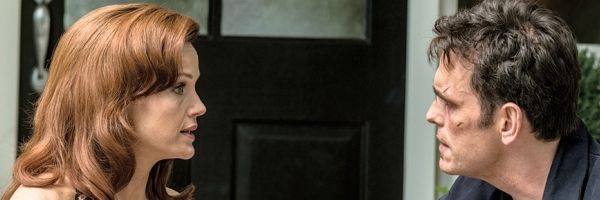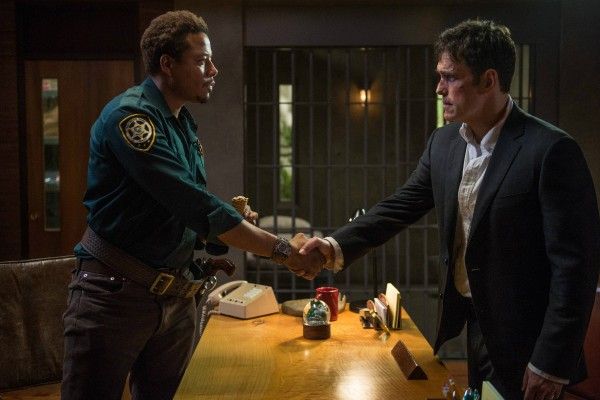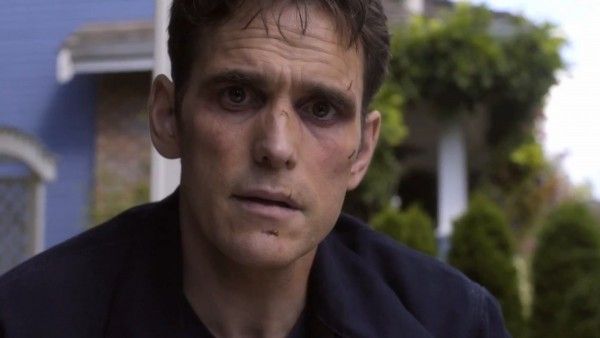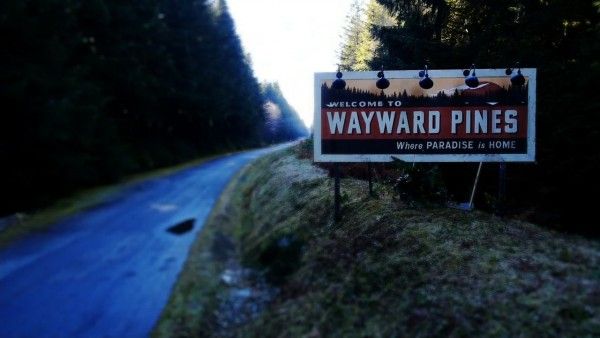Not all that long into Wayward Pines, series creator Chad Hodge's follow-up to The Playboy Club, Ethan Burke (Matt Dillon), a Secret Service agent, is asked politely to "evacuate" a motel room that he can not pay for. He's not asked to "leave" or "exit" but "evacuate," a word that suggests an emergency or imminent danger. This exchange ends up being a perfect encapsulation of what is so deeply off about this supernatural drama, though, to be honest, the fact that the series is executive produced and, in the case of the pilot, directed by M. Night Shyamalan might have been reason enough. Indeed, the series shares a litany of the stylistic accents, in both narrative and imagery, that have typified Shyamalan's films, especially following Signs. Burke, like so many of Shyamalan's protagonists, is a smart, humble man stuck in the death grip of tyrannical overseers with no exit, usually in a slightly alien realm.
In this case, its the titular Middle-American town that Burke finds himself in while on a hunt for some of his colleagues who have gone missing, namely his former partner, Kate Hewson (Carla Gugino). A car crash robs Burke of his main mode of transportation and leaves him in the clutches of Pam (Melissa Leo), an oddly controlling nurse who tries desperately to keep him in the hospital. As it turns out, its not the hospital coffee that makes Pam act like that, at Burke finds himself surrounded by an intensely obedient society where indiscretions can garner lethal consequences. From the very beginning, the writers begin teasing the strange, highly secretive system that runs the town and the beings that invented and implemented this system, whoever or whatever they might be. In fact, that begins to become all the series is really about.
Hodge and his crew have fallen into a familiar trap of building up an overtly ominous and mysterious plot that robs the series of any sense of personality. The characters are either in on the plan and can't stop denying the conspiracy, or not in the know and constantly trying to figure out what's going on. It's what typifies the relationship between Burke and Pope, the town's smooth-talking sheriff (Terrence Howard), as well as the confused Secret Service agent's interactions with Dr. Jenkins (Toby Jones) and Hewson, who he discovers is seemingly happily married and settled down in the town but still drops hints that the bucolic environs hide something far more nefarious. Even when there are flashbacks to the world outside, the scenes speak less to the characters and their distinct perspectives than it does about the premise or the convoluted storylines.
Wayward Pines is ultimately more about the town and the forces that govern it than it is about the people that are living in it, but, to be fair, the series' creators have crafted a few clever details that draw you in, from the executions that they call "reckonings" to the tremendous gates that separate Wayward Pines from the rest of the world to the menacing creatures that live just outside those gates. It's all pretty alluring and attention-grabbing, but by the time Burke's wife, Theresa (Shannyn Sossamon) and son, Ben (Charlie Tahan), are roped into this nonsense, there are simply too many narrative balls being juggled to take any of the proceeding action or twists seriously. The uniformly talented cast renders a great deal of this watchable but there's no sense of insight or personal feeling in either the dialogue or the way the series has been shot. Indeed, in terms of visuals, most of the credit should be given to Curt Beech's stylish and nuanced production design.
In essence, Wayward Pines is Twin Peaks without David Lynch; a world of pointedly odd, paranoid stipulations and supernatural occurrences utilized to shroud the shallowness of its characters and story rather than to use the surroundings as an inventive reflective surface for the inner lives of the town's denizens. And it would be easier to ignore Shyamalan's involvement with the series if this wasn't exactly the issue with his films lately, each one more overwrought than the last and remarkable only in each film's admittedly original premise. This certainly makes Wayward Pines nifty in concept but in execution, the series itself is marked only by its air of endless anticipation, a rote way of treading dramatic water to draw in more viewers for a twist that doesn't even come close to justifying the amount of time spent building up to the "bombshell" moment. Even that would be tolerable if this moment didn't inevitably beget yet another slow-burn build-up that ends in a disappointing blow-out of backstory.
★★ Fair — Only for the dedicated




